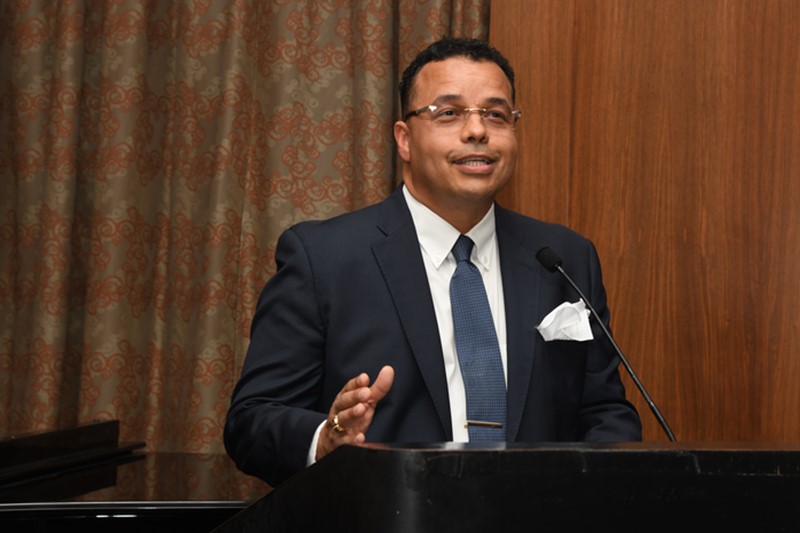
“It’s too new”, “it will change my DNA” and “it might impact my fertility” are common reasons cited for COVID-19 vaccine hesitancy.
Even though COVID-19 seems to be in retreat, “Getting the vaccine is the most important thing you can do,” Dr. Daniel Laroche said in a recent interview.
As the Director of Glaucoma Services and President of Advanced Eyecare of New York, Dr. LaRoche has joined the battle against vaccine hesitancy by educating his patients and others about vaccine misconceptions and emphasizing the importance of getting a COVID-19 vaccine.
Studies show that Black, Hispanic and Native American people are about four times more likely to be hospitalized and nearly three times more likely to die of COVID-19 than white people. African Americans have nearly the lowest rates of vaccination among any ethnic group. In fact, white Americans are being vaccinated at a rate three times higher than Black Americans. New Centers for Disease Control figures show that of those who have received at least the first dose of a vaccine, 5.4 percent are Black people, compared to 60 percent who are white. According to recent studies, about 35 percent of Black Americans said they don’t plan to get the vaccine, citing fears about safety and concerns that the vaccinations are ineffective.
By September, 75 percent of the adult population in the United States had received at least one dose of a COVID-19 vaccine. While this progress represents a marked achievement in vaccinations, coverage remains uneven across the country. Black and Hispanic people remain less likely than their white counterparts to have received a vaccine, leaving them at increased risk, particularly as variants arise.
“There is an urgency to spread the message that COVID vaccines are saving lives. It is critical that people of color get the correct information that these vaccines are making the difference between life and death. Many are getting misinformation and have based their decisions on not getting the vaccinations on untruths or unfounded fears. However, in the medical community we are seeing the heartbreaking results of those decisions,” said Dr. Laroche.
In addition to getting vaccinated, Dr. LaRoche stresses the importance of keeping up with regular health care visits, including vision checks, to prevent blindness caused by glaucoma. In most cases of glaucoma, there is no pain, and the loss of vision occurs slowly from peripheral to central. Many people do not even realize it’s happening until they have lost a substantial amount of peripheral vision. But he wants you to know there is a way to prevent the devastating effects of glaucoma: Don’t skip your eyecare visits.
People at risk for glaucoma include the elderly, Black people, people with elevated eye pressure, primary relatives with glaucoma, persons with high myopia, high hyperopia, history of eye trauma and diabetes.
The elevated intraocular pressure from glaucoma damages the optic nerve mechanically and creates decreased blood flow to the eye. The most identifiable cause of glaucoma is the enlarged lens or cataract in the eye. Early cataract surgery and trabecular bypass has become the best option to stop vision loss in patients with glaucoma. The current use of eyedrops and laser help to lower intraocular pressure but do not address the causative mechanism of the glaucoma being the enlarged lens. Incisional cataract surgery and glaucoma surgery is often needed to truly stabilize glaucoma.
All people should be screened regularly for glaucoma as part of a medical eye exam. Screening should consist of an eye examination consisting of gonioscopy (examination of the drainage angle), intraocular pressure measurement with Goldmann applanation tonometry and a dilated optic nerve examination. If there appears to be any damage to the optic nerve or abnormal pressure, then a visual field test should be performed, and optic nerve photos taken. Persons with thin corneas should be more aggressively monitored and treated for glaucoma as the disease tends to be worse in these patients.
If you have eye pressure or glaucoma and feel that you may be losing vision, Dr. Laroche recommends that you seek the care of a glaucoma specialist for a second opinion. DON’T GO BLIND FROM GLAUCOMA! People with conditions such as glaucoma and diabetic retinopathy that could lead to blindness if left unchecked need to stay particularly vigilant with their checkups. The pandemic shouldn’t keep you from visiting your doctor, and everyone should get vaccinated for the Covid 19 virus. He also encourages people to wear face masks on visits and maintain social distancing, even if they are in a health clinic, and if you’re high-risk, consider adding eye protection when in public spaces.
“Eyesight or human vision is one of the most important senses. As much as 80 percent of what we feel comes through our sense of sight. By protecting the eyes, people will reduce the chance of blindness and vision loss while also staying on top of any developing eye diseases, such as glaucoma and cataracts.


